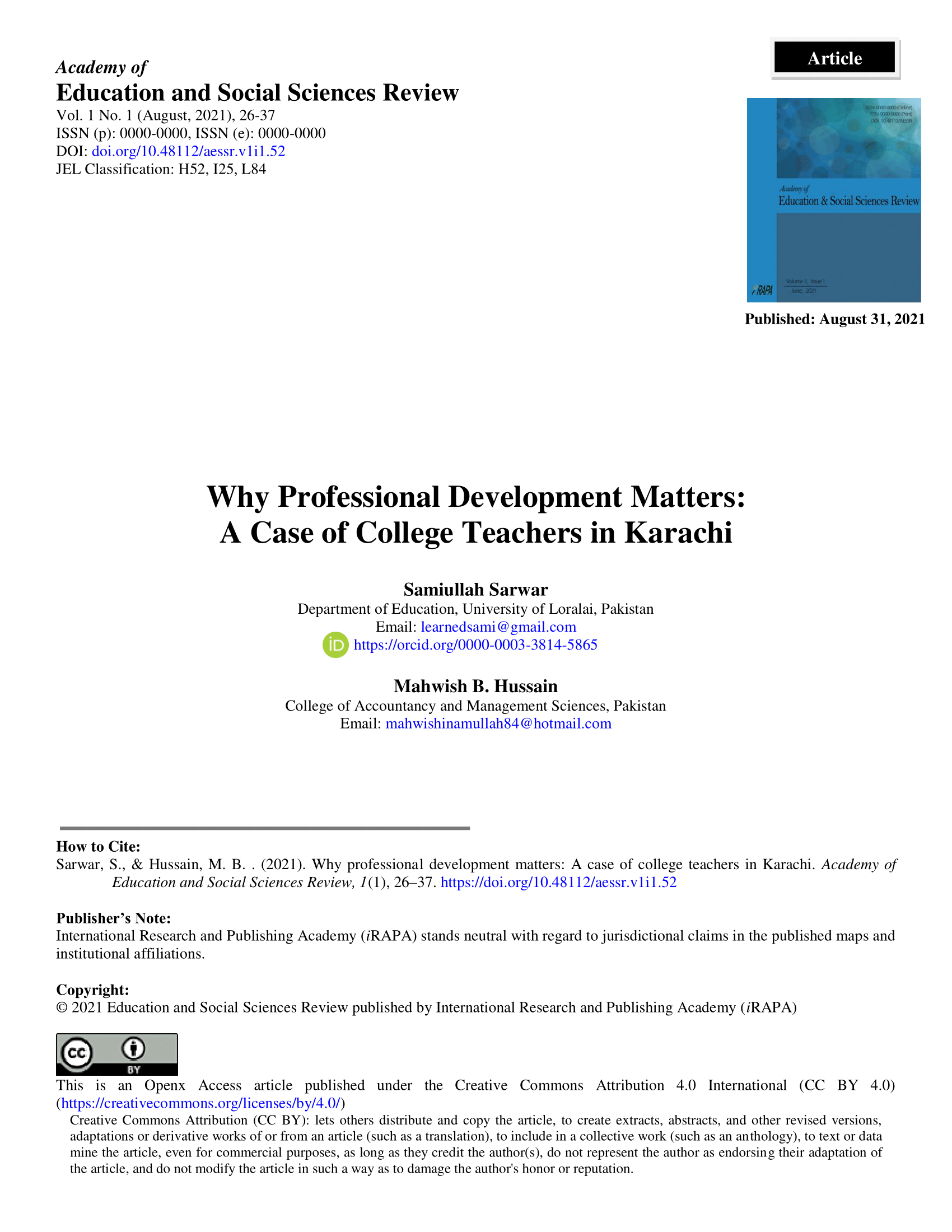Why Professional Development Matters: A Case of College Teachers in Karachi
DOI:
https://doi.org/10.48112/eassr.v1i1.52Abstract
 Abstract Views: 336
Abstract Views: 336
The predominant teachers’ professional development practice in Pakistan can be stated as limited, fragmented, short termed, and pre-packaged as it occurs on margins of having more focus on training sessions rather than problem-solving. This qualitative research aims to share the results of a small-scale study, involving 12 college teachers working in public sector institutions on their perceptions of professional development and the support they get from their educational institutions. It then proposes a three-branched solution that includes: (a) government and institution supported PD; (b) availability and delivery of multiple PD approaches based on the needs assessment of the teachers; and (c) on-going follow-up and evaluation of teachers’ professional development system to suit the local context. This study recommends that effective PD, if considered wisely, can become the process through which educators can examine thoughtfully and critically the purpose, role, structure, and organization of the institutions concerning the increasingly diverse students and communities they serve. The educational field in Pakistan needs a new ethics for PD; one that is sincerely supported and reflected in the educational policies of the country.
Keywords:
change for transformation, college teachers, needs assessment, professional developmentReferences
Aleandri, G., & Refrigeri, L. (2013). Lifelong learning, training and education in globalized economic systems: Analysis and perspectives. Procedia-social and Behavioral Sciences, 93, 1242-1248. DOI: https://doi.org/10.1016/j.sbspro.2013.10.022
Antoniou, P., & Kyriakides, L. (2011). The impact of a dynamic approach to professional development on teacher instruction and student learning: Results from an experimental study. School Effectiveness and School Improvement, 22(3), 291-311. DOI: https://doi.org/10.1080/09243453.2011.577078
Antoniou, P., & Kyriakides, L. (2013). A dynamic integrated approach to teacher professional development: Impact and sustainability of the effects on improving teacher behaviour and student outcomes. Teaching and Teacher Education, 29, 1-12. DOI: https://doi.org/10.1016/j.tate.2012.08.001
Clandinin, D. J., & Husu, J. (Eds.). (2017). The SAGE handbook of research on teacher education. London: Sage. URL: https://bit.ly/39gbk4Y
Creswell, J. W., & Poth, C. N. (2018). Qualitative inquiry and research design: Choosing among five approaches (4th Ed), London: SAGE Publications. URL: https://bit.ly/3nHjQCD
Blossfeld, P. N., Blossfeld, G. J., & Blossfeld, H. P. (2015). Educational expansion and inequalities in educational opportunity: Long-term changes for East and West Germany. European Sociological Review, 31(2), 144-160. DOI: https://doi.org/10.1093/esr/jcv017
Darling-Hammond, L., & McLaughlin, M. W. (2011). Policies that support professional development in an era of reform. Phi delta kappan, 92(6), 81-92. DOI: https://doi.org/10.1177/003172171109200622
DeMonte, J. (2013). High-quality professional development for teachers: Supporting teacher training to improve student learning. New York: Center for American Progress. URL: https://eric.ed.gov/?id=ED561095
Dilshad, M., Hussain, B., & Batool, H. (2019). Continuous professional development of teachers: A case of public universities in Pakistan. Bulletin of Education and Research, 41(3), 119-130. URL: https://eric.ed.gov/?id=EJ1244673
Engestrom, Y. (2015). Learning by expanding. Cambridge: Cambridge University Press. URL: https://bit.ly/3hCwYVS
Gopang, I. B. (2016). Teacher education and professional development programs in Pakistan. The International Journal of Research in Teacher Education ,7(1):1-14. URL: https://bit.ly/3AsAsBu
Grieve, A. M., & McGinley, B. P. (2010). Enhancing professionalism? Teachers’ voices on continuing professional development in Scotland. Teaching Education, 21(2), 171-184. DOI: https://doi.org/10.1080/10476210903281482
Hargreaves, A. (2014). Handbook of professional development in education: Successful models and practices, PreK-12. London: Guilford Publications. URL: https://bit.ly/3tKGE5n
Kalinowski, E., Gronostaj, A., & Vock, M. (2019). Effective professional development for teachers to foster students’ academic language proficiency across the curriculum. A systematic review: AERA Open, 5(1), 1–23. DOI: https://doi.org/10.1177/2332858419828691
Kolb, D. A. (1984). Experience as the source of learning and development. Upper Sadle River: Prentice Hall. URL: https://doi.org/10.1002/job.4030080408
Memon, G. R. (2007). Education in Pakistan: The key issues, problems and the new challenges. Journal of Management and Social Sciences, 3(1), 47-55. URL: https://bit.ly/3nDK09u
Mincemoyer, C. C., & Kelsey, T. W. (1999). Assessing in-service education: Identifying barriers to success. Journal of Extension, 37(2), 2. URL: https://bit.ly/3kcZwXx
Nasreen, A., & Odhiambo, G. (2018). The continuous professional development of school principals: Current practices in Pakistan. Bulletin of Education and Research, 40(1), 245-266. URL: https://bit.ly/2VKiVFY
Nicholls, G. (2014). Professional development in higher education: New dimensions and directions. New York: Routledge. URL: https://bit.ly/2Xn9vAy
Osamwonyi, E. F. (2016). In-service education of teachers: Overview, problems and the way forward. Journal of Education and Practice, 7(26), 83-87. URL: https://bit.ly/3nxQAhI
Postholm, M. B. (2012). Teachers’ professional development: A theoretical review. Educational Research, 54(4), 405-429. DOI: https://doi.org/10.1080/00131881.2012.734725
Sharma, U., Loreman, T., & Forlin, C. (2012). Measuring teacher efficacy to implement inclusive practices. Journal of Research in Special Educational Needs, 12(1), 12-21. DOI: https://doi.org/10.1111/j.1471-3802.2011.01200.x
Showers, B., & Joyce, B. (1982). The coaching of teaching. Educational Leadership, 40(1), 4-10. URL: https://eric.ed.gov/?id=EJ269889
Smith, K., & Sela, O. (2005). Action research as a bridge between pre‐service teacher education and in‐service professional development for students and teacher educators. European Journal of Teacher Education, 28(3), 293-310. DOI: https://doi.org/10.1080/02619760500269418
Woodcock, S., & Hardy, I. (2017). Probing and problematizing teacher professional development for inclusion. International Journal of Educational Research, 83, 43-54. DOI: https://doi.org/10.1016/j.ijer.2017.02.008

Downloads
Published
How to Cite
Issue
Section
License
Copyright (c) 2021 Academy of Education and Social Sciences Review

This work is licensed under a Creative Commons Attribution 4.0 International License.




















